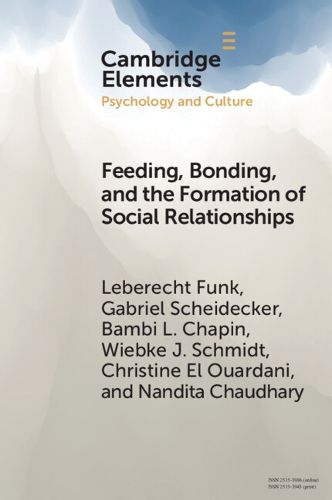Readings Newsletter
Become a Readings Member to make your shopping experience even easier.
Sign in or sign up for free!
You’re not far away from qualifying for FREE standard shipping within Australia
You’ve qualified for FREE standard shipping within Australia
The cart is loading…






This Element explores multi-faceted linkages between feeding and relationship formation based on ethnographic case studies in Morocco, Madagascar, Sri Lanka, Taiwan, and Costa Rica. Research demonstrates that there are many culturally valued ways of feeding children, contradicting the idea of a single universally optimal feeding standard. It demonstrates further that in many parts of the world, feeding plays a central role in bonding and relationship formation, something largely overlooked in current developmental theories. Analysis shows that feeding contributes to relationship formation through what we call proximal, transactional, and distal dimensions. This Element argues that feeding practices can lead to qualitatively distinct forms of relationships. It has important theoretical and practical implications, calling for the expansion of attachment theory to include feeding and body-centered caregiving and significant changes to global interventions currently based on 'responsive feeding.' This title is also available as Open Access on Cambridge Core.
$9.00 standard shipping within Australia
FREE standard shipping within Australia for orders over $100.00
Express & International shipping calculated at checkout
Stock availability can be subject to change without notice. We recommend calling the shop or contacting our online team to check availability of low stock items. Please see our Shopping Online page for more details.
This Element explores multi-faceted linkages between feeding and relationship formation based on ethnographic case studies in Morocco, Madagascar, Sri Lanka, Taiwan, and Costa Rica. Research demonstrates that there are many culturally valued ways of feeding children, contradicting the idea of a single universally optimal feeding standard. It demonstrates further that in many parts of the world, feeding plays a central role in bonding and relationship formation, something largely overlooked in current developmental theories. Analysis shows that feeding contributes to relationship formation through what we call proximal, transactional, and distal dimensions. This Element argues that feeding practices can lead to qualitatively distinct forms of relationships. It has important theoretical and practical implications, calling for the expansion of attachment theory to include feeding and body-centered caregiving and significant changes to global interventions currently based on 'responsive feeding.' This title is also available as Open Access on Cambridge Core.